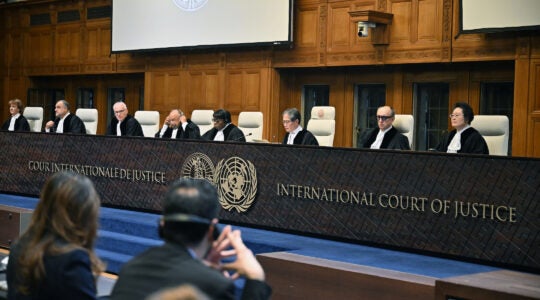TEL AVIV (JTA) – On his first U.S. tour as defense minister for the Olmert government, Ehud Barak is hoping to shore up Israel’s security interests ahead of any major peace moves with the Palestinians.
In Washington this week for talks with Bush administration officials and congressional leaders, Barak is trying to promote joint U.S.-Israel missile defense projects and exchange views on the threats posed by Iran’s nuclear program.
Among others, Barak is meeting with Vice President Dick Cheney, Bush national security adviser Stephen Hadley, congressional leaders and Barak’s U.S. counterpart, Secretary of Defense Robert Gates.
A former prime minister, Barak is no stranger to the United States and its vital role as Israel’s guardian ally. But now, playing outrider for Prime Minister Ehud Olmert, Barak is tasked with preparing the ground for next month’s Israeli-Palestinian peace conference in Annapolis, Md.
It may not be a role Barak relishes.
Tarnished by the failed Camp David peace summit of 2000, Barak has voiced reluctance to authorize Israeli concessions to the Palestinians that might compromise Israel’s security, such as the removal of West Bank roadblocks.
When he met U.S. Secretary of State Condoleezza Rice in Jerusalem on Sunday, Barak said Israel would reserve the right to exert security measures in the West Bank even if the territory is ceded to Palestinian Authority President Mahmoud Abbas.
“It seems that Barak is trying to reassert himself vis-a-vis the Americans,” one veteran Israeli diplomat observed.
Barak took over the defense ministry this summer with a pledge to rehabilitate Israel’s armed forces after their unexpected setbacks in the 2006 war against Lebanon’s Hezbollah.
With one eye on the prospects for a nuclear-armed Iran and the other on the low-tech terrorist threats posed by the Palestinians, Barak has ordered new arms and tougher training. He also has instituted an ethos of official silence.
This approach was made manifest in Israel’s mysterious airstrike in Syria last month for which Jerusalem has refused to provide any details.
The New York Times reported over the weekend that the target of the Sept. 6 sortie was a fledgling nuclear reactor and that some Bush administration officials felt Israel had struck too early. Barak in Washington may be facing fresh questions on the airstrike.
But Israeli officials said that in his talks with Cheney and Gates, Barak instead is focusing on the future – specifically how Israel will protect itself should it no longer control the West Bank.
The incessant short-range rocket fire into Israel from the Gaza Strip since Israel quit that territory in 2005 bodes ill for any similar moves in the West Bank, which abuts the heart of the Jewish state.
Israel’s defense ministry and the Pentagon long have been partners on the Arrow defensive missile system, which is designed to shoot down ballistic missiles of the kind used by Iran and Syria. But Barak is worried also that medium-range rockets like those used by Hezbollah may eventually find their way into Gaza.
A relatively recent joint U.S.-Israel project called David’s Sling is aimed at tackling the threat of medium-range rockets. As part of an integrated strategic approach that some have dubbed “Sealed Skies,” Israel separately is developing Iron Dome, a system to deal with the short-range rockets currently favored by Hamas and other Palestinian terrorist groups.
The problem is that David’s Sling and Iron Dome are at least two to three years from completion – the Arrow already is operational. Barak may be more keen on focusing on this threat than on discussing with his U.S. counterparts how Israel and the Palestinians can be brought closer together.
JTA has documented Jewish history in real-time for over a century. Keep our journalism strong by joining us in supporting independent, award-winning reporting.





